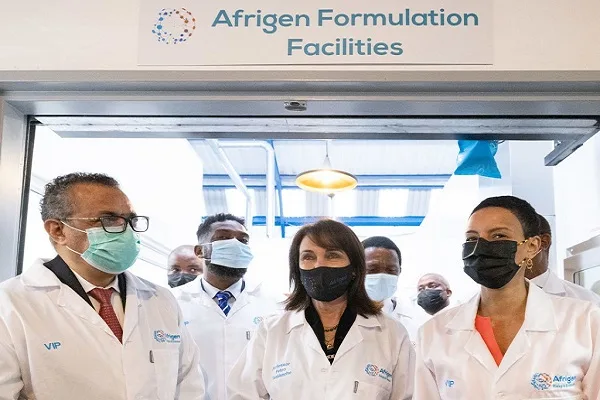South Africa Opens mRNA Technology Transfer Hub
South Africa officially inaugurated the #mRNA Technology Transfer Hub at Afrigen in South Africa. The official opening coincided with a WHO meeting in Cape Town of more than 200 international delegates working on the mRNA Technology Transfer Program.
South African Minister of Health Dr Joe Phaahla, Minister of Higher Education & Science Blade Mzimande, Minister of Trade & Industry Mr Ebrahim Patel were joined by WHO Director-General Dr Tedros Adhamon Ghebreyesus and WHO Regional Director for Africa, Dr Matshidiso Moeti.
In his keynote address, WHO DG Dr Ghebreyesus underscored: “I am delighted to be here in Cape Town with our partners to support a sustainable model for mRNA technology transfer to give low- and middle-income countries equitable access to vaccines and other lifesaving health products. I am immensely proud of the achievement of all those involved in this project; in less than two years we have shown that when we work collaboratively, we succeed collectively.”
The #COVID pandemic has brought to light the gross inequity with respect to access to critical vaccine or other medical products. As of March 2023, 70% of the world population had received at least one dose of a COVID vaccine. The remaining 30% who have not received any dose is mostly in Africa and other low-income countries (LIC).
Therefore, the mRNA Technology Transfer Program aims to contribute to equitable access to the latest vaccine technology by enhancing manufacturing and distribution capabilities across the African continent.
“What we see here today, is a moment in history, a Programme that is aimed at empowering LMICs through a global collaborative network. I am thrilled to see the progress made in such a relatively short time and welcome the support from so many different countries – countries like South Africa that have a strong vibrant biomanufacturing capacity and that are willing to work together, learn from and share with each other.”
South African Minister of Health Dr Joe Phaahla
African Excutive Director Professor Petro Terblanche declared that his team is thrilled to achieve this key milestone with the completion of the mRNA Technology Platform. The Hub has the capability to develop and produce mRNA vaccine from end-to-end in its laboratory and is currently working on scaling production with a promising Made in Africa mRNA vacinne candidate dubbed AfriVac 2121.
Phase I/II clinical trials of the vaccine is due to start soon, and the production facility is designed to meet GMP standards. In paralle, Afrigen will continue to carry out training and technology transfer to network partners.
The founder states mobilized some USD 117 million as seed money for the project. For this meeting, the AU, EU, Germany, Canada, Norway, Belgium as well as ELMA Foundation sent representatives.
Caroline Delany, Global Affairs Canada’s Director General for Southern and Eastern Africa said: “Canada reaffirms its continued support of the mRNA Technology Transfer Programme and we are delighted to announce a further contribution of 15 million Canadian dollars at the meeting today. This brings Canada’s total contribution to the Programme up to 45 million Canadian dollars. These funds support the running of the Hub in South Africa as well as network partners around the world. We firmly believe in the importance of building capacity at local and regional level”.
Mr Martin Seychell, Deputy Executive Director European Commission, said. “The EC has already contributed €40 million to the establishment of the mRNA technology transfer Hub and has recently signed another grant with the EIB for €15,5 million to facilitate the expansion of vaccines manufacturing capacity. This is part of the overall investment under the EU Global Gateway strategy, where more than €1 Billion have been mobilised under the Team Europe Initiative on Manufacturing health products. It is now particularly important to also address possible regulatory and demand bottlenecks, to ensure not only production of vaccines of the highest standard in all regions of the world, but also rapid and equitable access to those vaccines.”

